News & Events in Belarus
Lukashenko discusses future of Belarusian science
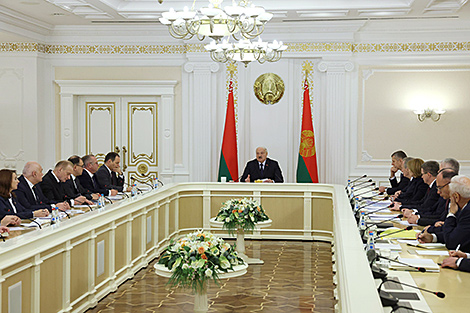
MINSK, 3 December (BelTA) - The future of Belarusian science and the work of the National Academy of Sciences of Belarus (NASB) were the key topics of the meeting of Belarusian President Aleksandr Lukashenko with the working group to analyze the activities of the National Academy of Sciences of Belarus, BelTA correspondent reports.
Serious conversation on a mega-important issue
At the beginning of the meeting, the head of state noted that the agenda included a serious conversation about how science, primarily academic, will develop, and how to live further - with or without science. “The answer is unambiguous,” the head of state said. Aleksandr Lukashenko emphasized: “Without effective academic science, the development of the country will be problematic. With the science we have, we will not be able to accelerate and we will not achieve any success.”
According to the president, this conclusion follows from the materials presented to him. However, it is not an assertion, and during the current meeting and subsequent events the key problems of academic science are to be discussed and ways to address them are to be found.
Aleksandr Lukashenko explained that he had received reports on the state of affairs in the scientific environment not only from the working group, but also from the leadership of the National Academy of Sciences. The provisions of this report are said to be a consolidated position of the NASB leadership and the scientific community of the academy. In such a situation, the president believes it is correct to first meet with the working group to analyze the NASB activities, to analyze the provisions of the NASB report with specialists, scientists, and then to hold a meeting at the Academy of Sciences and to discuss everything in detail in order to come to a unified opinion.
“The topic is mega-important for the country,” Aleksandr Lukashenko emphasized. “We will not be able to develop the country without science. We have already done everything we could in the country, primarily in the economy. We need to develop further, relying on science. We cannot do anything without science. Investment in science and technology has become a key condition for the wellbeing of the state, a guarantee of progressive competitive development.”
More money for science if there are results
The president emphasized that Belarus invests in domestic science, supports new areas of research, and creates the most favorable conditions for science.
“Unfortunately, the Academy of Sciences has not become a driver of the country's scientific and technical advancement so far. We have very few breakthrough scientific solutions,” the head of state remarked. “We do not see the payoff that we expected from the Academy. There is no monetization of the Academy of Sciences' research and development. And this is the main criterion for assessing its effectiveness.” It raises a question whether the country needs the Academy of Sciences in the current form and whether it would be better to focus on industry-specific, university science.
Some argue that science should get more financing. The president reasonably responded that results will be rewarded decently.
A huge shortcoming of the government
The head of state criticized the shortcomings in the activities of the NASB, but also emphasized that these issues apply not only to the Academy of Sciences, but also to the State Committee on Science and Technology and appropriate ministries. "Maybe they apply to them first of all," Aleksandr Lukashenko said. "Why does the State Committee fulfill its coordinating and controlling role? This is the main function, for which it was created."
According to the president, the analysis of scientific projects shows that ministries do not actually engage in them. They are practically absent among the customers. "This is a huge shortcoming of the government. Do the industries have no demand for scientific development?" the head of state asked rhetorically. “Roman Golovchenko [Belarusian Prime Minister], the government works like timeservers: from day to evening, and that's all. What about the future? It is impossible to move forward without science."
“Why have we farmed out such popular and most state-funded areas as drone production, space, digital and biotechnology to the Academy of Sciences?” the president added. “It is the customer, executor and controller itself. How can we deal with these areas without specialists who understand what the economy needs?” The president noted that there is no result and no one is to blame.
"Research for the sake of research, if it does not meet the country's development objectives, is a labor of Sisyphus," he concluded.
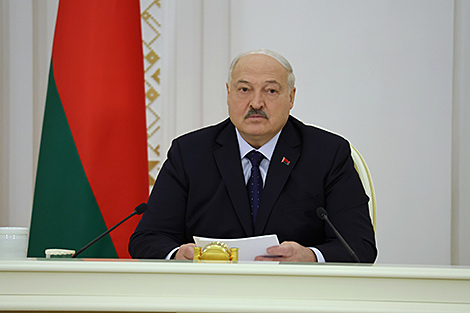
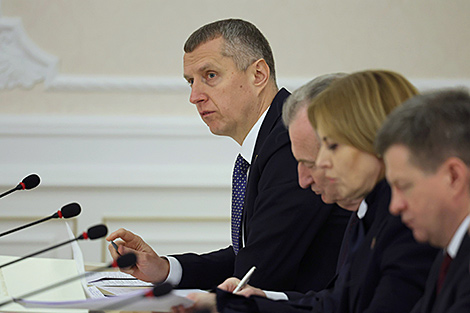
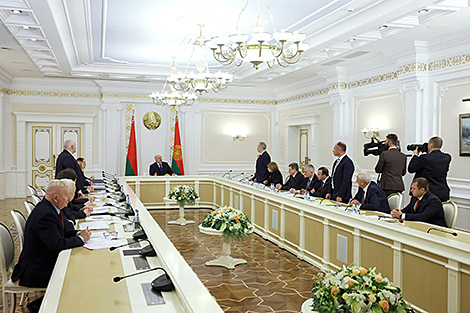
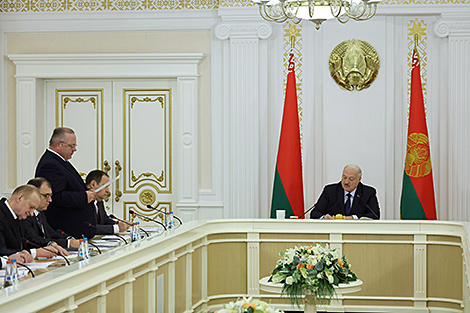
No scientific disputes, only concrete measures
The issue of how to make the scientific sector produce results that meet the demands of the real sector of the economy has already been discussed in Belarus, and now it is time to finally work out concrete measures, Aleksandr Lukashenko said.
“In the new five-year period, science in all its forms - academic, industry, higher education - should be practice-oriented, focused on the same result as the country's economy,” the head of state said.
The second report of the working group to analyze the NASB activities with proposals to improve its work has been submitted to the president for consideration.
“Talks like “they in the State Control Committee do not understand anything” are unworkable. Specialists, scientists and officials have been involved in analyzing the activities of academic science. This is exactly how it should be done. I need a real picture about the state of affairs in the Academy of Sciences. I do not need to give a hard time to anyone. I need a real picture. I need the country to develop further,” the head of state stressed.
Aleksandr Lukashenko pointed out that the group is a permanent one to analyze every layer in the organization and activities of the NASB. The working group includes people from the scientific environment who are able to understand the existing problems.
From the participants of the event, the president expects proposals that can be put to practice: “There should be no scientific disputes here. All proposals should take into account the current situation in domestic science and, most importantly, the prospects for its development,” the head of state said.
The next stage of work will be a meeting at the Academy of Sciences with the invitation of members of the government, State Committee on Science and Technology, other stakeholders, in order to make final decisions on the further development of academic science in the country.
What problems the NASB has and what the working group is for
The working group to analyze the activities of the National Academy of Sciences of Belarus was established following the instruction of the head of state in June 2024. It works on a permanent basis and study the issues of practical orientation and effectiveness of scientific research and developments of NASB scientists, implementation of developments in the economy and social sectors, development of import-substituting products and technologies, export of scientific and technical products. Every year the president receives a report on the results of the group's work and proposals to address the identified problematic issues.
The head of state held the first meeting with the working group on 30 July 2024. Then, explaining the reason behind its creation, Aleksandr Lukashenko said: “We give all the priorities to science. It is impossible to develop without it. But recently I see that the Academy of Sciences has made serious miscalculations. Such things happen. Science is an area where you have to go off the beaten track, where you have to address serious problems, to conquer new peaks. Therefore, mistakes are possible of course. What alarmed me was the fact that mistakes were made by the Academy of Sciences where they should not be, where we have already learned something: in animal husbandry and crop production.”
The need for setting up the working group was prompted by appeals from some specialists and members of the government. “I am convinced that we need to take a serious look at the development of academic science and make appropriate decisions in all areas,” Aleksandr Lukashenko said.
According to the president, there are a lot of issues related to the activities of the scientific community: “There are some successes, but dissatisfaction with the results is also high. The permanent working group headed by the chairman of the State Control Committee, who has been instructed to involve responsible competent specialists in the group's activities, is set to deal with all the issues of the NASB development.
At the first meeting, Aleksandr Lukashenko warned against premature conclusions and focused on a detailed discussion of a wide range of issues facing the group, its goals and objectives. “This is exactly the way the conversation should go,” the president explained. “I do not want the heads of the National Academy of Sciences and scientists present here to think that we are preparing some kind of action against the Academy of Sciences. No. We need to take a serious approach to studying the problems of the Academy of Sciences and make appropriate decisions, because there is no way forward without science.”
The group was to deliver the first report on the results of its work at the end of the year. The decisions mentioned above should be made later.







 print version
print version make home page
make home page add to bookmarks
add to bookmarks

